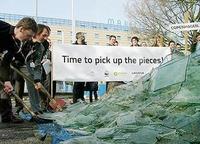 各國政府的氣候談判代表們在4月9日於德國波昂開啟了一場三天一輪的正式會議。這是去年12月哥本哈根峰會中,達成了沒有約束力的政治性哥本哈根協議之後,各國代表首次的正式會議。由於京都議定書將在2012年底到期,因此聯合國與許多國家的目標,都放在制定一個對全球溫室氣體排放有法律約束力的協議。
各國政府的氣候談判代表們在4月9日於德國波昂開啟了一場三天一輪的正式會議。這是去年12月哥本哈根峰會中,達成了沒有約束力的政治性哥本哈根協議之後,各國代表首次的正式會議。由於京都議定書將在2012年底到期,因此聯合國與許多國家的目標,都放在制定一個對全球溫室氣體排放有法律約束力的協議。
當代表們進入大廳時,通過了由環保團體所運來的4噸重玻璃碎片,這些碎片象徵著破碎的國際氣候協議,環保團體希望代表們好好回到工作位置。
將玻璃碎片運來並放在會議廳外的團體TckTckTck夥伴、德國監測(Germanwatch)、世界自然基金會(WWF)以及樂施會(Oxfam)指出,4噸的玻璃代表攝氏4度,攝氏4度是全球將因為哥本哈根協議失敗,所能忍受不致毀滅的升溫上限。
但是第一天的波昂會談中顯示,各國政府間存在有很深的歧見。
美國與中國不同意由韓國所提出,有關於是否要在今年重新起草談判草案的提案。中國代表蘇偉表示,基礎工作已經包含在原本的草案中,但美國代表潘興(Jonathan Pershing)表示,此草案包括了超過100頁的備註條款,表示其中尚很多爭議。
哥本哈根協議本身就具有很大的爭議。
這份在去年12月由美國、中國、印度、巴西與南非領導人所制定的協議,並不具有法律約束力,它並沒有經過表決,僅只是一份簡單的備註。
雖然歐盟與全世界194個國家中的111個都表示支持哥本哈根協議,委內瑞拉代表薩勒諾(Claudia Salerno)在9日仍對波昂會議的代表們說,這份協議根本稱不上真正的協議。
大多數的科學家、政府以及非政府組織都同意,要避免災難性的氣候變化,全球溫度上升的幅度不能超過工業革命前的水準攝氏2度以上。
在哥本哈根會議時,委內瑞拉與其他發展中國家都表示,他們無法接受協議草案,因為它缺乏減少二氧化碳排放量的遠大目標。
非洲代表團說,波昂會議中的發展中國家代表對哥本哈根協議普遍的看法是「由少數人所操弄的黑箱作業」,用剛果共和國的說法就是「托西姆帕努姆帕努(Tosi Mpanu Mpanu)」。
在哥本哈根協議之下,有75個會員國承諾,將依據聯合國氣候變化綱要公約(UNFCCC),在2020年以前減少或限制溫室氣體的排放,這些國家的排放量在能源的使用上,佔全球的80%。
NFCCC執行秘書德布爾(Yvo de Boer)說:「今年年底將會在墨西哥舉辦氣候會議,因此需要建立有效的合作機制,來加速國家、區域以及國際間限制排放量成長的行動,並且準備面對氣候變遷所造成的必然衝擊。」
全世界的多邊發展銀行(MDBs)和國際貨幣基金(IMF)領袖9日在盧森堡的歐洲投資銀行舉行會議,制定了有關支持永續全球復甦的方案,並且同意哥本哈根協議是一個動以財政措施來對抗氣候變遷的行動機會。
在周日的波昂會談結束之後,下一次的氣候談判會議是主要經濟體能源和氣候論壇(Major Economies Forum on Energy and Climate),將會4月18至19日於美國華府的國務院召開。
國務院的聲明指出,「此論壇的目的在於促進主要已開發國家與開發中國家之間坦誠的對話,使得氣候變遷與乾淨能源挑戰的會議能有所進展,促進開發具體措施,並且統整合資企業,在降低溫室氣體排放的同時,提高提高乾淨能源供應量。」
主要經濟體論壇的17個主要成員是:澳洲,巴西,加拿大,中國,歐盟,法國,德國,印度,印尼,意大利,日本,韓國,墨西哥,俄羅斯,南非,英國,和美國。
玻利維亞政府即將於4月19至22日,在科恰班巴(Cochabamba)召開世界人民氣候變化與地球母親權利會議(World People's Conference on Climate Change and the Rights of Mother Earth)。組織這次會議的人說,這次會議的目的是讓民間社會和政府的代表,圍繞著共同且公正的要求,以便提供聯合國氣候變化會談新的動力和方向。
玻利維亞會議有17個工作小組,負責對一些議題提出建議。例如:碳交易的風險、京都議定書、森林、農業和糧食主權。
另一輪由UNFCCC在波昂所舉辦的官方談判會期排定在5月份。
Government climate negotiators today opened a three-day round of official talks in Bonn, the first since the Copenhagen summit ended in December with the weak Copenhagen Accord, a political agreement. Many countries and the United Nations had aimed for a legally binding deal to limit global greenhouse gas emissions after the Kyoto Protocol expires at the end of 2012.
As they entered the hall, delegates passed a four tonne pile of broken pieces of glass dropped by environmental groups to send the message that now is the time to pick up the broken pieces of the international climate accord and get back to work.
TckTckTck partners, Germanwatch, WWF and Oxfam, the groups who dropped the glass outside the conference hall, say four tonnes of glass represents four degrees Celsius, the upper range of temperature increase the world will experience as a result of the failure to come to an agreement at the Copenhagen summit.
But the first day of the Bonn talks displayed deep fractures among governments.
The United States and China disagreed over whether to write a new draft negotiating text this year as proposed by South Korea. Chinese delegate Su Wei said a basis for work already exists in a previous text, but the U.S. delegate Jonathan Pershing said that text has over 100 pages of bracketed clauses, which denote disputed text.
The Copenhagen Accord itself was a major point of contention.
The document, drawn up last December by leaders from the United States, China, India, Brazil and South Africa, is not legally binding and it was not voted upon or signed, but simply noted.
While 111 countries and the European Union, out of the world's 194 governments, have indicated their support for the Copenhagen Accord, Venezuela delegate Claudia Salerno told Bonn delegates today that it is not really an "accord," at all.
Most scientists, governments and nongovernmental organizations agree that the global temperature can rise no more than two degrees C (3.6 degrees F) above pre-Industrial Revolution levels to avoid catastrophic climate change.
In Copenhagen, Venezuela and other developing countries said they could not accept the draft Accord because it lacked ambitious targets for reducing carbon emissions.
Developing country delegates in Bonn generally view the Copenhagen Accord as "a secret text put together by a selected few," in the words of Tosi Mpanu Mpanu of the Democratic Republic of Congo, speaking for the Africa Group.
Under the Copenhagen Accord, the UN Framework Convention on Climate Change, UNFCCC, has received national pledges to cut or limit emissions of greenhouse gases by 2020 from 75 Parties, which together account for more than 80 percent of global emissions from energy use.
"The climate conference at the end of this year in Mexico therefore needs to put in place effective cooperative mechanisms capable of bringing about significant acceleration of national, regional and international action both to limit the growth of emissions and to prepare for the inevitable impacts of climate change," de Boer said.
Leaders of the world's multilateral development banks and the International Monetary Fund, meeting today at the European Investment Bank in Luxembourg, mapped out their plans to support a sustainable global recovery and agreed the Copenhagen Accord is an opportunity for action to finance measures to combat climate change.
After the Bonn talks conclude on Sunday, the next climate negotiating session to open will be the Major Economies Forum on Energy and Climate at the U.S. State Department in Washington April 18 through 19.
This forum is intended to "facilitate a candid dialogue among major developed and developing economies to make progress in meeting the climate change and clean energy challenge, and advance the exploration of concrete initiatives and joint ventures that increase the supply of clean energy while cutting greenhouse gas emissions," according to the State Department.
The 17 major economies that are members of the Major Economies Forum are: Australia, Brazil, Canada, China, the European Union, France, Germany, India, Indonesia, Italy, Japan, Korea, Mexico, Russia, South Africa, the United Kingdom, and the United States.
The Bolivian government is convening the World People's Conference on Climate Change and the Rights of Mother Earth on April 19 through 22 in Cochabamba. This conference aims to allow civil society and government representatives to coalesce around common, just demands in order to give a new impetus and direction to the UN talks on climate change, organizers say.
The Bolivian conference has 17 working groups which will produce proposals on, for instance, the dangers of carbon markets, the Kyoto protocol, forests, agriculture and food sovereignty.
Another official negotiating round hosted by the UNFCCC in Bonn is scheduled for May.





